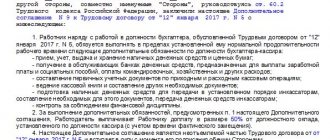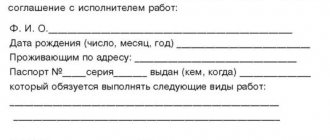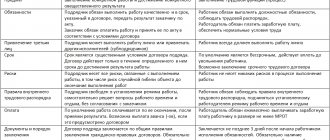Is an employment contract canceled if an employee is unable to start work due to illness?
An employment contract concluded in the written form established by law can be canceled if the employee does not begin to perform his official duties on the start date of work specified in the contract. A canceled contract is equivalent to an unconcluded one.
The possibility of canceling employment contracts relieves both employees and employers from unnecessary paperwork. An employee, without any negative consequences, can refuse a planned return to work, and the employer has the opportunity to quickly change the personnel situation by recognizing the contract with such an employee as not concluded.
According to labor law, the employer is not obliged to find out the reason for the employee’s absence from the workplace on the day when, according to the employment contract, he is supposed to start work. The employee’s illness is not a circumstance preventing the cancellation of the contract.
However, the employer remains obligated to pay disability benefits to the employee whose contract was canceled if he provides sick leave. The opening date of the sick leave is very important - benefits will be paid only if the employee falls ill before the day the employment contract is cancelled.
Despite the fact that illness, also confirmed by a sick leave certificate, is a valid reason for absence from work, the employer by law has the right to cancel the contract with an employee who does not show up for work on the first day. Each employer decides independently whether to restore employment relations with such an employee after the cancellation of the employment contract. If it is decided to rehire a sick employee, his relationship with the employer is formalized again in the standard form of an employment contract.
Constitution of the Russian Federation
Article 37
- Labor for freedom. Everyone has the right to directly freely dispose of their ability to work, choose their type of activity, profession
- Forced labor is prohibited
- Everyone has the right to work in conditions that meet safety and hygiene requirements, to remuneration for work without any discrimination and not lower than the minimum wage established by federal law, as well as the right to protection from unemployment
- The right to individual and collective labor disputes is recognized and the methods for resolving them established by federal law are used, including the right to strike.
- Everyone has the right to rest. A person working under an employment contract is guaranteed the length of working hours established by federal law, weekends and holidays, and paid annual leave.
Refusal of official employment
Article 67 of the Labor Code of the Russian Federation establishes the employer’s obligation to conclude a written agreement with the employee. contract within 3 days from the date of commencement of work duties. For non-compliance with this norm, a fine is provided (Article 5.27 of the Code of Administrative Offenses of the Russian Federation). For legal entities persons, the fine is at least 50 thousand rubles. Two copies of the work are printed. contracts, one of which is transferred to the employee (Article 67 of the Labor Code of the Russian Federation). The absence of a signed employment contract does not mean that the employee is deprived of all the rights granted to him by the Labor Code. The contract is considered concluded by default if the employee began to perform his work duties at the direction of the employer (the head of the company or his representative). But in this case, the right to officially be considered an employee of a particular organization must be proven. If an employee begins to work without signing a contract, and the employer refuses to conclude it after three days, then the first possible action should be an attempt to convince management to formalize the employment relationship. You can notify the director in writing about the obligation to formalize the work. agreement upon actual admission to work, referring to Article 67 of the Labor Code of the Russian Federation, and demand familiarization with the order for employment. If the employer refuses to enter into an agreement even under pressure, you need to be ready to confirm the fact of working in the organization. To do this, you need to collect evidence of the existence of an employment relationship and the performance of assigned job functions. It is important to confirm the fact that the employee was allowed to perform duties by the employer himself, or his representative who has the right to do so. Otherwise, the employer may claim that the employee decided to work on his own and no one entrusted him with the work. So, having evidence, an employee can protect his rights at work. inspection or in court. If it is proven that he was actually allowed to perform his duties, the organization will pay a fine and compulsorily formalize the work. relationship. At the same time, even in the absence of an employment contract in which the amount of the employee’s salary should be specified, it is the employer who will have to prove in court that he has no debts to the employee. What can serve as proof of admission to work? This:
- any documents dated and related to the work (orders, instructions, acts, receipts, copies of reports, etc.);
- a certificate of the amount of salary and insurance contributions (the employer must issue such a certificate upon application);
- the fact of receiving a salary, sick leave, vacation, etc.;
- audio and video recordings confirming the fact of work;
- testimony of witnesses (colleagues, clients);
- availability of uniform, building pass, access to corporate mail, etc.
So, citizens can protect their labor rights and prove their right to official employment by all legal means - this opportunity is given by the Constitution and Article 352 of the Labor Code of the Russian Federation. If it is not possible to resolve the conflict due to refusal of employment peacefully, then it is resolved in court.
Documents required in special cases:
- a certificate of the presence or absence of a criminal record or the fact of criminal prosecution - when applying for a job related to activities to which, in accordance with the Code or other federal law, persons who have or have had a criminal record, are or have been subject to criminal prosecution are not allowed.
- Certificate of health for persons under 18 years of age, as well as other persons in cases provided for by the Code and other federal laws (Article 69 of the Labor Code of the Russian Federation).
Article 66 – about the work book
The work book is the main document about the employee’s work activity and length of service.
The employer keeps work books of employees who have worked for him for more than 5 days, when the work is their main job.
The work book contains information about the employee, about hiring, dismissal, transfer to another job, about the nature of the work performed, about incentives and promotions.
Article 67 – on the form of the employment contract
Opportunity to work without an employment contract for an individual entrepreneur - a family member
This possibility is not permissible from a legal point of view. Members of the entrepreneur's family must be officially registered for work - by labor. contracts. Family ties do not play a role in this case. Labor relations imply the subordination of employees to work rules, certain conditions, and the performance by them of a certain list of duties for a fee. If family members of an individual entrepreneur are subject to a certain regime, perform work assigned by the entrepreneur and receive payment for it, then they have an employment relationship with him. Article 67 of the Labor Code of the Russian Federation, part 1, establishes the mandatory written form of labor. agreement. But at the same time, unregistered employment relationships are also valid if the employee, with the knowledge of the employer, begins to carry out his instructions and proves this in court. Having admitted an employee to work, the employer is obliged to conclude an agreement with him within three days (Part 2, Article 67 of the Labor Code of the Russian Federation). Thus, the law does not allow exceptions for relatives. Regardless of whether the employee is a family member, the individual entrepreneur is obliged to conclude an employment contract with him after allowing him to perform his duties. Failure to comply with this requirement of the Labor Code of the Russian Federation entails liability:
- fine from 50,000 to 100,000 rubles for legal entities. persons;
- fine from 5,000 to 10,000 rubles. for persons conducting business activities without legal education. persons (Clause 3, Article 5.27 of the Code of Administrative Offenses of the Russian Federation).
Documents required for employment:
- passport or other identity document;
- work book , except for cases when an employment contract is concluded for the first time or the employee starts working on a part-time basis;
- insurance certificate of state pension insurance
- military registration document - for those liable for military service and persons subject to conscription for military service;
- document on education , qualifications or special knowledge - when applying for a job that requires special knowledge or special training;
Commentary on Article 67 of the Labor Code of the Russian Federation
1. The commented article is aimed at regulating the issues of concluding an employment contract and, in fact, the form of the employment contract.
Part 1 of the commented article provides for mandatory written form when concluding an employment contract. This requirement of Part 1 of the commented article is established in order to ensure that both the employee and the employer can confirm the existence of an employment relationship. In this case, the employment contract is concluded in two copies, one of which is, respectively, with the employee, and the other with the employer.
At the same time, Part 1 of the commented article places a special requirement on a copy of the employment contract, which is kept by the employer. It must contain the employee’s signature confirming receipt of a copy of the contract. In practice, such a signature is issued by the employee’s endorsement of a copy of the employment contract kept by the employer. An employee visa usually includes an indication that the second copy of the employment contract was received by the employee, his signature and the date of receipt of the second copy of the employment contract.
2. Part 2 of the commented article regulates such a procedure as the actual admission of an employee to work. It lies in the fact that the employer, without preliminary execution of an employment contract, actually allows the employee to work, in other words, the employee starts work (fulfilling his job duties) before an employment contract is concluded with him. Such actual admission in accordance with Part 2 of the commented article is possible: - with the knowledge of the employer, that is, with his verbal consent or notification from the employee (usually verbally); - on behalf of the employer, which can also be given orally or in writing.
At the same time, Part 2 of the commented article allows for the possibility of actual admission to work with the knowledge or on behalf of not only the employer, but also his representative. According to paragraph 12 of the resolution of the Plenum of the Armed Forces of the Russian Federation on the application by the courts of the Labor Code of the Russian Federation, the representative of the employer in this case is a person who, in accordance with the law, other regulatory legal acts, constituent documents of a legal entity (organization) or local regulatory acts, or by virtue of a contract concluded with this person the employment contract is vested with the authority to hire employees, since it is in this case that when the employee is actually admitted to work with the knowledge or on behalf of such a person, an employment relationship arises, and the employer may be obligated to formalize the employment contract with this employee properly.
Such actual admission to work is possible taking into account its nature, for example, when admission is necessary due to the fact that the work does not require delays, breaks or downtime.
It should be noted that in practice, this particular procedure causes quite a lot of controversy, since when admitted to work with the knowledge or instructions of the employer, expressed orally, proving the fact of such admission causes difficulties. In this regard, we believe that Part 2 of the commented article in this aspect requires improvement and clarification in terms of the presentation of special requirements for the procedure for the actual admission of an employee to work.
At the same time, Part 2 of the commented article contains special requirements for the procedure following the actual admission of the employee to work. The employer is obliged to draw up an employment contract with the employee in writing no later than three working days from the date the employee is actually allowed to work. This requirement is due to the fact that employers in some cases are reluctant to enter into an employment contract with an employee, since this means that the employer will have a number of obligations, in particular, to provide the employee with guarantees provided for by labor legislation and to pay insurance premiums in respect of him . Part 2 of the commented article does not determine the date in accordance with which it is necessary to draw up an employment contract with the employee. We believe that this should be the date the employee is actually allowed to work.
In accordance with the Federal Law of December 28, 2013 N 421-FZ “On Amendments to Certain Legislative Acts of the Russian Federation in Connection with the Adoption of the Federal Law “On Special Assessment of Working Conditions”, Part 2 of the commented article was supplemented with another provision establishing the term of imprisonment employment contract. This addition regulates the situation in which relations related to the use of personal labor arose on the basis of a civil law contract, but were subsequently recognized as labor relations. In this case, the employment contract must be concluded no later than three working days from the date of recognition of these relations as labor relations, unless otherwise established by the court.
Let us remind you that according to Art. 19.1 of the Labor Code of the Russian Federation, recognition of relations arising on the basis of a civil law contract as labor relations can be carried out in two ways: - on the basis of a written application of an individual who is the executor under the specified contract, and (or) an order of the state labor inspector to eliminate the violation that has not been appealed in court Part 2 Art. 15 Labor Code of the Russian Federation. In this case, the person who uses personal labor and is the customer under the specified agreement recognizes the relationship that has developed with the employee as an employment relationship and enters into an employment contract with him; - in court, if an individual who is a executor under the specified agreement applied directly to the court, or based on materials (documents) sent by the state labor inspectorate, other bodies and persons with the necessary powers in accordance with federal laws.
3. Part 3 of the commented article contains a rule that provides for in some cases the need to coordinate the conclusion of an employment contract or its terms with the relevant persons or bodies that are not employers under these contracts, or the need to draw up employment contracts in a larger number of copies. Such cases are not directly established by the commented article; such a need may be provided for by labor legislation and other regulatory legal acts containing labor law norms in relation to certain categories of workers.
Another comment to Art. 67 Labor Code of the Russian Federation
1. The mandatory written form of an employment contract was established in 1992. According to the Labor Code in its original version, an employment contract could be concluded both in written and oral form. The Labor Code provides only for a written form of employment contract.
An employment contract that is not formalized in writing is considered concluded if the employee began work with the knowledge or on behalf of the employer or his authorized representative. Consequently, failure to comply with the form of the employment contract does not entail the invalidity of the latter: the contract is considered concluded from the moment the employee begins work. From the same moment, the employment contract is considered to have entered into force (see Article 61 of the Labor Code and commentary thereto).
At the same time, the contract is considered concluded and entered into force only if the employee began work with the knowledge or on behalf of the employer or his authorized representative.
The representative of the employer in this case is a person who, in accordance with the law, other regulatory legal acts, constituent documents of a legal entity (organization) or local regulations, or by virtue of an employment contract concluded with this person, is vested with the authority to hire employees, since in this case upon actual admission of an employee to work with the knowledge or on behalf of such a person, an employment relationship arises (Article 16 of the Labor Code) and the employer may be obligated to formalize an employment contract with this employee in a proper manner (clause 12 of the Resolution of the Plenum of the Armed Forces of the Russian Federation dated March 17, 2004 No. 2 “On the application by the courts of the Russian Federation of the Labor Code of the Russian Federation”). This rule was introduced in order to protect the employer from actions of its employees beyond the scope of their competence. However, this rule threatens the interests of the employee, since it is not always obvious to him whether the person allowing him to work is acting within the limits of his competence or, conversely, arbitrarily.
Current legislation obliges the employer, when actually admitting an employee to work, to draw up an employment contract with him in writing no later than three working days from the date of actually admitting the employee to work (Part 2 of the commented article). Failure to fulfill this obligation, which has a pronounced public legal nature, is the basis for administrative liability of the relevant official of the employer (Article 5.27 of the Code of Administrative Offenses of the Russian Federation with comments). Failure of the specified person to fulfill the obligation to draw up an employment contract serves as the basis for bringing him to disciplinary liability.
2. The law does not provide for a single mandatory form of an employment contract, therefore it can be drawn up in any form acceptable to the parties. To simplify the determination of details and the formulation of the main terms of the contract in employing organizations, it is advisable to develop a standard (unified) form (form) of an employment contract, filled out by the parties when concluding it, as an annex to the internal labor regulations in force in the organization or to a collective agreement. The presence of a unified form of an agreement does not exclude the possibility of its conclusion in a different form.
When concluding an employment contract for work in the Far North, it is advisable to be guided by the Recommendations for concluding an employment agreement (contract), reflecting the specifics of regulating social and labor relations in the conditions of the North, approved. Resolution of the Ministry of Labor and Social Development of the Russian Federation dated July 23, 1998 No. 29.
Currently, a number of federal departments have approved standard forms of employment contracts that reflect the specifics of the use of labor in the organizations (institutions) of these departments.
3. The employment contract is drawn up in two copies, each of which is signed by the parties. One copy of the contract is given to the employee, the other is kept by the employer, and the receipt by the employee of a copy of the employment contract must be confirmed by the employee’s signature on the copy of the contract kept by the employer. Failure to comply with this rule does not entail the invalidity of the employment contract.
Thus, the number of copies of an employment contract is regulated by law in a mandatory manner. The parties have the right to draw up copies of the agreement subject to the restrictions established by Chapter. 14 Labor Code (see Chapter 14 Labor Code and commentary thereto). At his request, the employer is obliged to provide the employee with a copy of the employment contract according to the rules established by the Labor Code (see Article 62 of the Labor Code of the Russian Federation and the commentary thereto).
4. An employer - an individual who is not an individual entrepreneur - is obliged to register a written agreement with an employee in the relevant local government body (see Article 303 of the Labor Code and the commentary thereto).









